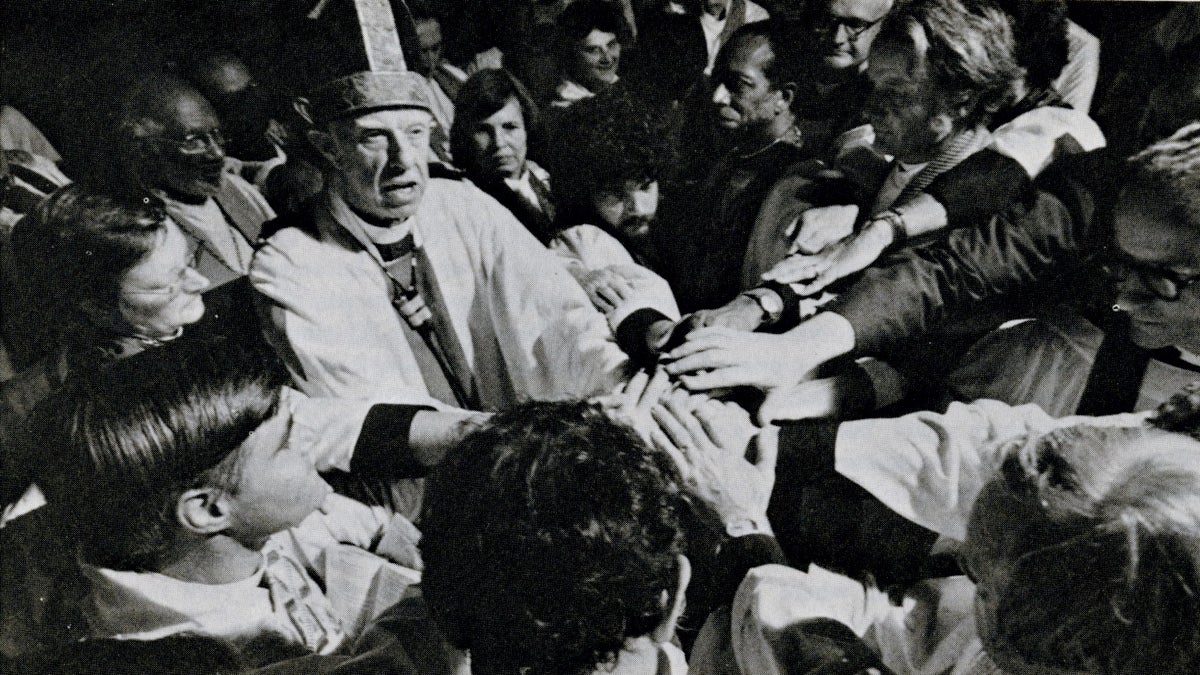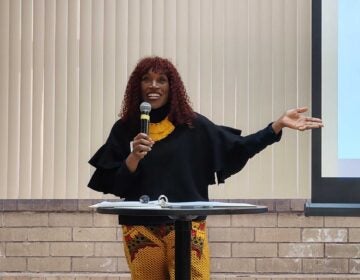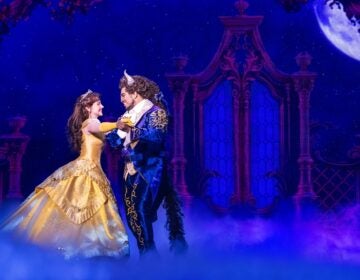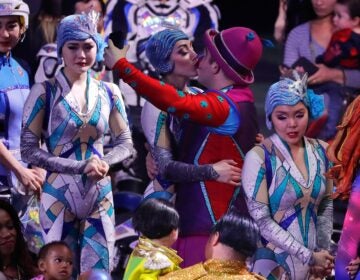‘Philadelphia 11’ blazed trail for female priests in the Episcopal Church
Listen
On July 29, 1974, 11 women were ordained as Episcopal priest at he Church of the Advocate in North Philadelphia. It was an 'act of tender defiance' of Episcopal law.
Forty years ago, women were ordained for the first time as Episcopal priests at the Church of the Advocate in North Philadelphia. It was an illegal ceremony that would alter the future of the Protestant denomination.
Called the Philadelphia 11, the women were from around the country — many did not know one another — and congregated in Philadelphia to receive the laying of hands by four bishops, whose calling to bestow the responsibilities of the priesthood onto women opposed official Episcopal law.
“The mind of the church was not there,” said the Rev. Storm Swain, director of Anglican studies at the Lutheran Theological Seminary at Philadelphia. “It had been voted down once before.”
This was a time of widespread ferment in secular and religious spheres: the civil rights movement, women’s liberation and liberation theology. In 1974, a strong wind was blowing that suggested large institutions, such as Law and Religion, should not tell people how to believe. Rather the people — as in The People — should guide the philosophy of their institutions.
“There was a sense that the life and work of women in the church is an expression of the Holy Spirit, and the canon will have to catch up with the mind of the church,” said Swain. “The canon cannot lead the theological mind of the church.”
After a general assembly of Episcopal leaders in 1973 voted down a proposal to allow women into the priesthood, many women felt the political route to ordination had been exhausted.
Discerning another path
“A lot of people met at Virginia Seminary to debrief on that,” said Alison Cheeks, at the time a deacon in the Diocese of Virginia. “I went to that meeting, and I thought, ‘I’ve got to get in there and work politically.’ At the end of the meeting, I saw there was no where to go politically.”
Cheek decided to take up an offer from a friend, Nancy Wittig, and push through to the priesthood without permission. They joined a group of other women who were training for the priesthood with the support of their local bishops.
The Philadelphia 11 ranged from a 27-year-old poet from Oregon, Alla Bozarth, to the 79-year-old Jeannette Picard — an already accomplished pioneer who has a spot in the International Space Hall of Fame for being the first woman in space. (She piloted a balloon into the stratosphere in 1934.)
It was no accident that the rogue ordination ceremony would take place at the Church of the Advocate in North Philadelphia. Its rector was Father Paul Washington, a prominent civil rights activist. The church had already been the site of a national convention of the Black Power movement.
“He was the priest to an area in the city that was not only depressed, but looked like it had been in a war zone,” said Cheek. “There were many, many people in that area who had been disenfranchised for years for a variety reasons. They were poor — that was the main part. So, it made a big difference that it was not a big, suburban church.”
‘An act of tender defiance’
It was hot that day — July 29, 1974 — and the church was packed with more than 2,000 people — including family, congregants, and media. Not all were friendly.
“There was one protester who was very dramatic and said that these women could offer up nothing but the sight, sound, and smell of perversion,” said Cheek. “Some in the congregation began to boo and hiss at that moment.”
“On one level it was scary,” said Wittig, another member of the 11. “But it was very clear as we got started that this was not just some vacant daydream by a bunch of women, but indeed a movement that was happening in the church.”
Delivering the sermon was Charles Willie, an African-American professor of education at Harvard University and a member of the Episcopal House of Deputies. He compared the ordination to the civil rights movement.
“This shouldn’t be seen as an act of arrogant disobedience,” said Dr. Willie from the podium. “But an act of tender defiance.”
After they completed the rite of ordination, the Philadelphia 11 found sympathetic individuals and like-minded dioceses that recognized them as priests. But the Episcopal Church, and the global Anglican Communion to which it belongs, saw the ceremony as irregular and invalid. They struggled to find jobs.
“It was a tremendous experience, but underneath it all I felt sad because I thought we would be deposed,” said Cheek.
Changes still unfolding
Even after the church voted to accept women as priests in the 1976 general assembly, the Philadelphia 11 were out of luck. Their rogue ordination ceremony remained legally irregular. Although the Episcopal Church welcomed women priests, it would not welcome these women.
Over time, the 11 worked individually with their local bishops to mend the irregularity.
“When you talk about the church, you talk about more than the institution — you talk about the baptized people,” said the Rev. Nancy Wittig, who went on to be the rector at St. Andrew’s-in-the-Field in Northeast Philadelphia. “My sense is that the church is still unpacking what that meant. Many things have changed. There was a sense that language needed to be addressed — the language was very male, very patriarchal.”
The 1976 decision in the general assembly was broader than just allowing women to the priesthood — it called for gender equality at all levels of church hierarchy, including bishops. The current presiding bishop of the national church is a woman: the Most Rev. Katharine Jefferts Schori.
Anglican churches in other countries have been bringing women in the fold piecemeal. Only last week the Church of England announced it would allow women to become bishops.
In New Zealand, where the Rev. Storm Swain is from, the church ordained its first female bishop in 1989. It was a decision that took a long time to settle with the congregation.
“When I was a priest in New Zealand, at least one parishioner wouldn’t receive Communion from me. I thought it was because I was a woman priest,” said Swain. “It was because I was ordained by a woman bishop. He didn’t think my ordination was valid. He would receive Communion from another woman priest who was ordained by a male bishop.”
WHYY is your source for fact-based, in-depth journalism and information. As a nonprofit organization, we rely on financial support from readers like you. Please give today.





